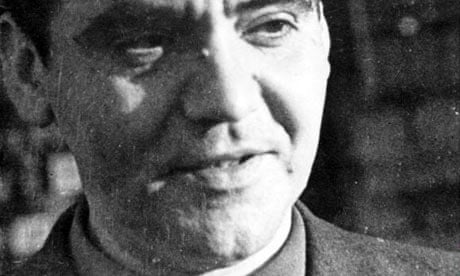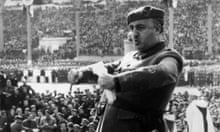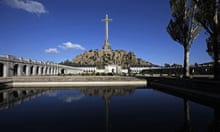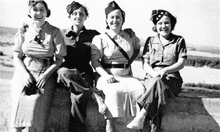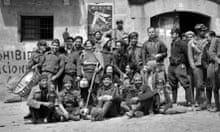A Spanish judge yesterday ordered the grave of poet and playwright Federico García Lorca dug up as, for the first time, the repression unleashed by the dictator General Francisco Franco was formally declared a crime against humanity.
In a controversial reversal of Spain's traditional refusal to seek out those responsible for the killings of Lorca and more than 100,000 other people, Judge Baltasar Garzón also asked investigators to provide him with information on Franco's chief henchmen and generals. Franco and his chief collaborators, Garzón said, had been responsible for "mass killings, torture and the systematic, general and illegal detentions of political opponents".
Death squads, military courts and other tribunals sent 114,000 people to their deaths during and after a three-year civil war in the 1930s that traumatised Spain for generations, according to the judge.
Several thousand lie in unmarked mass graves, despite the attempts of volunteers over the past eight years to disinter corpses and hand them over to relatives for reburial. The judge ordered the digging up of 19 such graves, including one on a hillside overlooking the southern city of Granada where Lorca is thought to have been shot in 1936. Lorca's family do not want the poet exhumed, but recently promised not to oppose a petition from relatives of two men shot and buried alongside him for the grave to be dug up.
"I'm very pleased. I've been waiting 10 years for this," said the granddaughter of one of them, Nieves Galindo.
Garzón requested formal proof that 35 generals and Francoist ministers are no longer alive. He also ordered the interior ministry to provide a list of those in charge of the pro-Francoist Falange movement up until 1951. It is doubtful, however, that any are still alive.
The judge explicitly said that his investigations included repression carried out until 1952, 13 years after Franco had won the civil war and established his dictatorship. Many Spaniards still find the period hard to talk about and some fear Garzón's investigation will reopen old wounds.
The right has been critical of the judge and of a recent "historical memory" law to help Franco's victims passed by the Socialist government of the prime minister, José Luis Rodríguez Zapatero.
An unwritten "pact of forgetting" underpinned Spain's rapid transition to democracy after Franco's death in 1975.
Garzón's critics claim that all civil war and Francoist repression is covered by a 1977 amnesty law and by rules which mean that most crimes lapse after 20 years. Garzón declared yesterday, however, that where a victim's body had not been found a crime of kidnapping was still being committed and had not lapsed.
The attorney general's office, which has opposed the judge's investigation, is expected to appeal against the decision. It argues that international human rights laws do not apply to the civil war as Spain was not signed up to them at the time.
Garzón has previously investigated repression by military regimes in Latin America in the 1970s. In 1998 he ordered the arrest of General Augusto Pinochet of Chile while he was in London but failed to get him extradited to face trial in Spain.
Spanish courts have been criticised for investigating crimes committed by other dictatorships without ever looking at those carried out under Franco.
· This article was amended on Tuesday October 21 2008. Our maths was out when we said a Spanish judge had investigated repression carried out until 1952, 17 years after Franco won the civil war. The war ended in 1939. This has been corrected.
